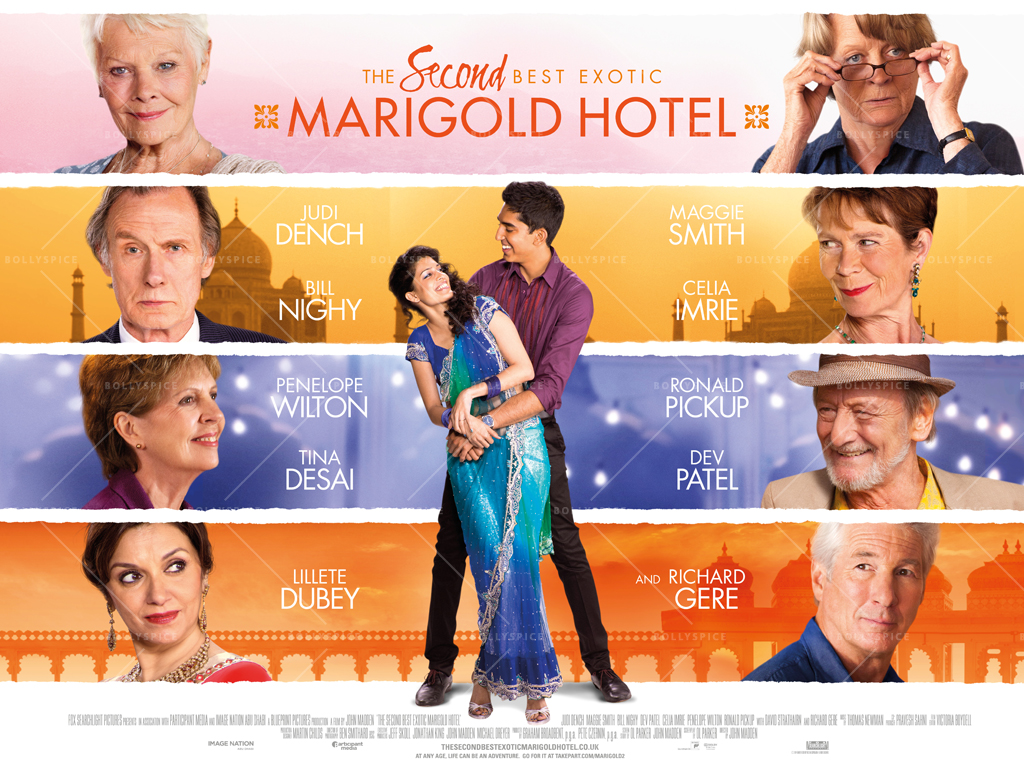
Yesterday I went to see the Second Best Exotic Marigold Hotel. The same winning ingredients – sumptuous setting in India, characters who combine being interesting with being vulnerable, and who are played by actors and actresses of consummate skill who are clearly enjoying themselves. Add to that a whole network of love stories which are emerging, or submerging in all the complexities of two human beings trying to understand each other while not fully understanding themselves; and of course the script, moving from condensed milk sweetness to bitter lemon tartness, and with some one liners that are clever, funny and at times movingly profound in their probing of our deep hopes and at times our deeper disappointments. When Richard Gere says he is 64 I am reassured that at least in one tiny fact at least, I am the same as him.
Which means to be 64 and watching a film about the possibilities and opportunities of retirement is to be asking, if not for trouble, at least for food for thought. Growing older has its positives, but if we are not careful we might buy into the cultural confusion about ageing we have all played our part in creating. The range of ageist responses from patronising concessions, culpable indifference, burden bearing resentment, optimism bordering on denial, to what Maggie Smith as the citrus tongued philosopher of the Hotel says, the one utterly unacceptable attitude that negates the real possibilities, the self pity of the old mourning their own mature chronology.
So at 64 the film brings me laughter, joie-de vivre, food for thought, and a heightened awareness of the key line of the whole film, and it is a happy misquotation by the overexcited Hotel Manager, "There is no present like the time." That is such a beautiful rearrangement of words. Time. Now. The present. The gift of time and the gift of the present. Time is a present, presented to us, now.
My own chronology, and chronic denial of its creeping limitations, means I;ve been sidelined from five a side football for a month and probably a month more. A badly strained soleus muscle. The physiotherapist suggesting I now run faster and stop more suddenly than my wee legs can take! But who then advises not to give up, but to train and strengthen the muscles, adjust my play, and go on keeping fit.
But the injury is a reminder that mobility isn’t to be taken for granted. And that the body doesn’t go on forever! Actually, I won't go on forever, another gentle but persistent reminder embedded in the film. Like many who start the third third of life I’m still unsure of many things as working life slows down. Some of that is an overactive sense of accountability. For all of us this can take the form of chronic guilt, or performance anxiety, or status maintenance or ego consciousness, and various other subterfuges of personal insecurity. In other words there is a spiritual dimension to retirement from major responsibility that involves learning to trust the purposes of God, relinquishing a Pelagian Christian work ethic – by that I mean assuming the faithfulness of my discipleship is performance based.
The current emphases in theological reflection are on embodiment, enacting, performing; but these must be heard as correlates of the grace that enables such embodiment, practice and performance. Salvation by works, that old legalism of the heart, remains a debilitating temptation to those who always want to prove to God they are worth saving, and to others that we are worth having around! What this film does is insist, persistently and consistently insist, there is no present but the time – each day is a gift to be received with thanksgiving, trust and loving care for those who struggle the same road, and wondering how we'll manage the tight corners, steep climbs and sudden landslides.
And yet. And Therefore. God’s call in the Third Third of life comes from the same God who calls, Giver of the same grace which enables, Source of the same love who purposes good, but does so now in the life of someone who has the same amount of time in a day as anyone else, sufficient energy and health at least for now.
A poem that has come to mean much to me is Edward Thomas's poem for his daughter "And You Helen":
And You, Helen
And you, Helen, what should I give you?
So many things I would give you
Had I an infinite great store
Offered me and I stood before
To Choose. I would give you youth,
All kinds of loveliness and truth,
A clear eye as good as mine,
Lands, waters, flowers, wine,
As many children as your heart
Might wish for, a far better art
Than mine can be, all you have lost
upon travelling waters tossed,
Or given to me. If I could choose
Freely in that great treasure-house
anything from any shelf,
I would give you back yourself,
And power to discriminate
What you want and want it not too late,
Many fair days free from care
And a heart to enjoy both foul and fair,
And myself, too, if I could find
Where it lay hidden and it proved kind.
There it is, a perfect review of the film and three lines that help us welcome life with the attitude there is no present like the time: " I would give you back yourself,/ and power to discriminate / what you want and want it not too late."



